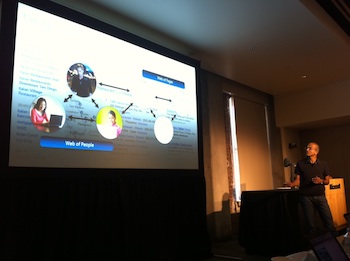
Back in October, Bing and Facebook unveiled a feature where Bing highlights search results that are endorsed by your Facebook friends (endorsements taking the form of Facebook Likes). So if you’re signed into Facebook and you perform a search for steakhouses on Bing, then if one of your Facebook friends has said they “like” a certain steakhouse, it will show up in a special section of the results called “liked by your Facebook friends”.
[aditude-amp id="flyingcarpet" targeting='{"env":"staging","page_type":"article","post_id":232868,"post_type":"story","post_chan":"none","tags":null,"ai":false,"category":"none","all_categories":"business,social,","session":"B"}']Today, the Bing team said it’s moving that social information out of a specialized box and into the regular algorithmic search results. For example, group program manager Paul Yiu showed search results for “baby won’t stop crying”. That’s a case where you probably don’t want to spend a lot of time reading multiple websites with lengthy instructions. Yiu saw in the Bing results that one of his friends had hit the Facebook Like button on a related article, so he clicked on that article first and found a handy list of tips about what to do when, yes, your baby won’t stop crying.
Satya Nadella, senior vice president at Microsoft’s online services division, acknowledged that even with today’s addition, Bing’s social features only affect a small percentage of search results. (One thing that increases usage is the fact that users don’t have to sign in to Bing — one out of five Bing visitors are already logged into Facebook, so they automatically get social results.) Still, Nadella said that when social data does improve results, “It’s magical to see some of the queries change.”
AI Weekly
The must-read newsletter for AI and Big Data industry written by Khari Johnson, Kyle Wiggers, and Seth Colaner.
Included with VentureBeat Insider and VentureBeat VIP memberships.
“Even if a small percentage [of searches] have this moment, it’s a big change,” he added. “And then you come to expect it, and it causes you to prefer one search engine over the other.”
Why is it so “magical”? On a theoretical level, Nadella said the Web is now divided into the “Web of pages” (which is the traditional Web) and the “Web of people” (the social connections on a site like Facebook). With its social search, Bing tries to connect these two areas.
VentureBeat's mission is to be a digital town square for technical decision-makers to gain knowledge about transformative enterprise technology and transact. Learn More
